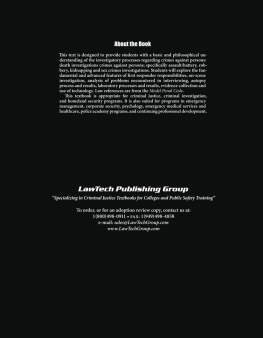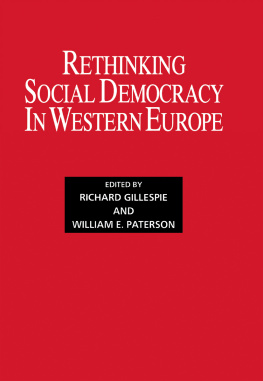Practical Social Investigation
Qualitative and Quantitative Methods in
Social Research
Practical Social Investigation
Qualitative and Quantitative Methods in Social Research
Christopher J Pole
Department of Sociology, University of Leicester
and
Richard Lampard
Department of Sociology, University of Warwick
First published 2002 by Pearson Education Limited
Published 2013 by Routledge
2 Park Square, Milton Park, Abingdon, Oxon OX14 4RN
711 Third Avenue, New York, NY 10017, USA
Routledge is an imprint of the Taylor & Francis Group, an informa business
Copyright 2002 Taylor & Francis
The rights of Christopher J. Pole and Richard Lampard to be identified as authors of this work have been asserted by the authors in accordance with the Copyright, Designs and Patents Act 1988.
All rights reserved. No part of this book may be reprinted or reproduced or utilised in any form or by any electronic, mechanical, or other means, now known or hereafter invented, including photocopying and recording, or in any information storage or retrieval system, without permission in writing from the publishers.
Notices
Knowledge and best practice in this field are constantly changing. As new research and experience broaden our understanding, changes in research methods, professional practices, or medical treatment may become necessary.
Practitioners and researchers must always rely on their own experience and knowledge in evaluating and using any information, methods, compounds, or experiments described herein. In using such information or methods they should be mindful of their own safety and the safety of others, including parties for whom they have a professional responsibility.
To the fullest extent of the law, neither the Publisher nor the authors, contributors, or editors, assume any liability for any injury and/or damage to persons or property as a matter of products liability, negligence or otherwise, or from any use or operation of any methods, products, instructions, or ideas contained in the material herein.
ISBN-13: 978-0-13-616848-5 (pbk)
ISBN-10:0 136 16848 5
British Library Cataloguing-in-Publication Data
A catalogue record for this book is available from the British Library
Library of Congress Cataloging-in-Publication Data
Pole, Christopher J. (Christopher John), 1959
Practical social investigation: qualitative and quantitative methods in social research /
Christopher J. Pole and Richard Lampard.
p. cm.
Includes bibliographical references and index.
ISBN 0-13-616848-5
1. Social sciencesResearchMethodology. I. Lampard, Richard. II. Title.
H62.P576 2002
300'.7'2dc21
2001021348
For Lizzie and Charlotte (C.P.)
In Memory of Pooler and Wub (R.L.)
Contents
Introducing social investigation: what is research
and why do we do it? |
Comparisons within research designs: contrasting groups and
complementary data |
Suitable samples: selecting, obtaining and profiting
from them |
Selecting and gaining access to a research setting and the people
within it |
Documents, official statistics and secondary analysis:
mining existing data sources |
Data analysis using SPSS for Windows: relevant material on the
web pages corresponding to this book |
Projects and dissertations methods and methodology
in a practical context |
The origins of this book lie in our experiences of teaching social research methods (to undergraduates, postgraduates and others), and also in our shared view that both qualitative and quantitative approaches have important roles to play in social research. From our perspective there is consequently a need for a research methods text which does justice to both approaches. Arguably there are already edited texts in existence which satisfy this need, but such texts can sometimes be rather fragmentary, and we hope that this book, written by two authors who have each used both approaches, succeeds in treating the approaches in a more integrated and coherent way.
This book is intended to be useful to students who are carrying out empirical research, regardless of whether they are doing so in the context of a taught course or to provide the raw material for a project report or dissertation. The emphasis is thus on research practice rather than on the philosophy of social research, though the book encourages the reader to reflect on the implications of the research techniques that she or he uses for the nature and meaning of her or his research findings.
In our experience, undergraduates, postgraduates and fully fledged researchers in the field of social studies all typically have gaps in their knowledge of social research methods. Hence, while this book is intended to be accessible to novice researchers at undergraduate level, much of its content will be of equal interest (or perhaps even greater interest) to postgraduates. (Perhaps the hallmark of a good social research methods text is that it is bought by first-year undergraduates who are still referring to it during and beyond their doctoral studies.) Of course, addressing such gaps in researchers' knowledge will sometimes stretch beyond the scope of our book, but we hope that the references that we have made to more detailed material will address some of these more specific needs.
We now turn to the structure of the book. The first chapter considers what research is, why it is done, and what forms of knowledge it generates. The second chapter focuses on the planning and design of research studies. The book then moves on to data-collection issues, with the third chapter focusing on the issue of sampling, in both its quantitative and qualitative forms. The fourth chapter looks at the collection of data via various forms of observation, whereas the fifth chapter focuses specifically on the survey method. The sixth chapter discusses aspects of interviewing.
Not all social research involves the generation of new data, and the seventh chapter focuses on the use of existing data in the form of documents, official statistics and survey datasets. In the eighth and ninth chapters attention turns to qualitative and quantitative forms of data analysis, though data analysis is an ongoing process which is consequently also referred to in the earlier, data-collection-orientated chapters. The tenth chapter considers the sometimes neglected topic of writing about research, and the eleventh and final chapter brings together material from the earlier chapters, within a holistic consideration of the research process built around two example projects. Supplementary material includes a glossary at the back of the book, and a companion set of web pages on the Internet (see the note that follows this Preface).
Finally, we would like to acknowledge the contributions made to the development of this book by a range of people. The students whom we have taught at the Universities of Leicester and Warwick (and elsewhere) have obviously had a profound impact on the ways in which we think and talk about research methods. In addition, various colleagues have worked on projects upon which this book draws as examples; we would therefore like to thank Angela Bolton, Bob Burgess, John Hockey, Phil Mizen, Marlene Morrison, Mo Padfield, Kay Peggs, Ian Procter and Annemarie Sprokkereef. We are grateful to Duncan Gallie and to Roger Jowell of SCPR (now the National Centre for Social Research) for permission to make available the sub-sets of survey data. The encouragement and support of Christina Wipf-Perry of Prentice Hall and of Matthew Smith of Pearson Education during the preparation of the book were invaluable, and we would also like to acknowledge the helpful comments of some anonymous reviewers. We, of course, must take the blame for the book's many imperfections.











